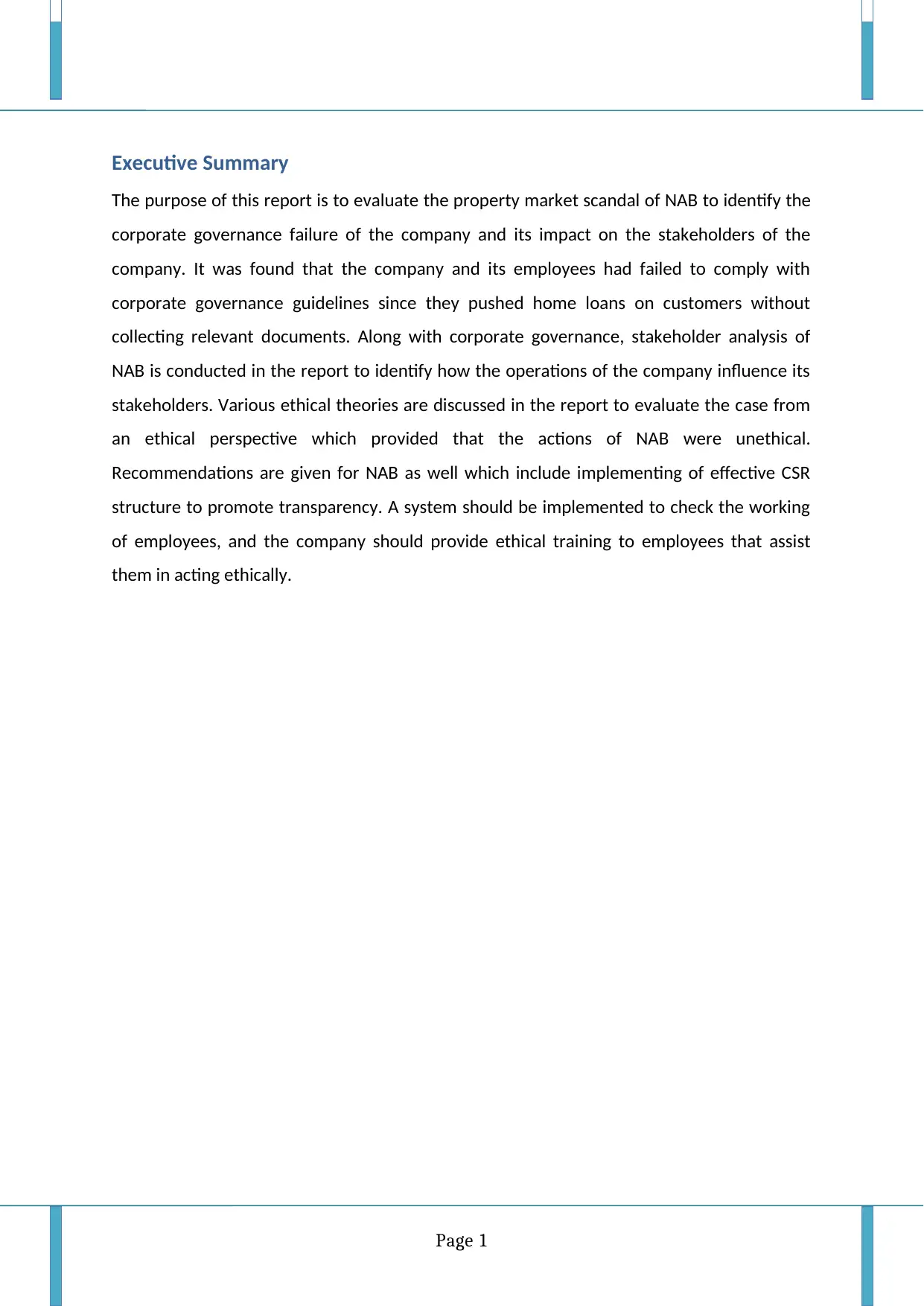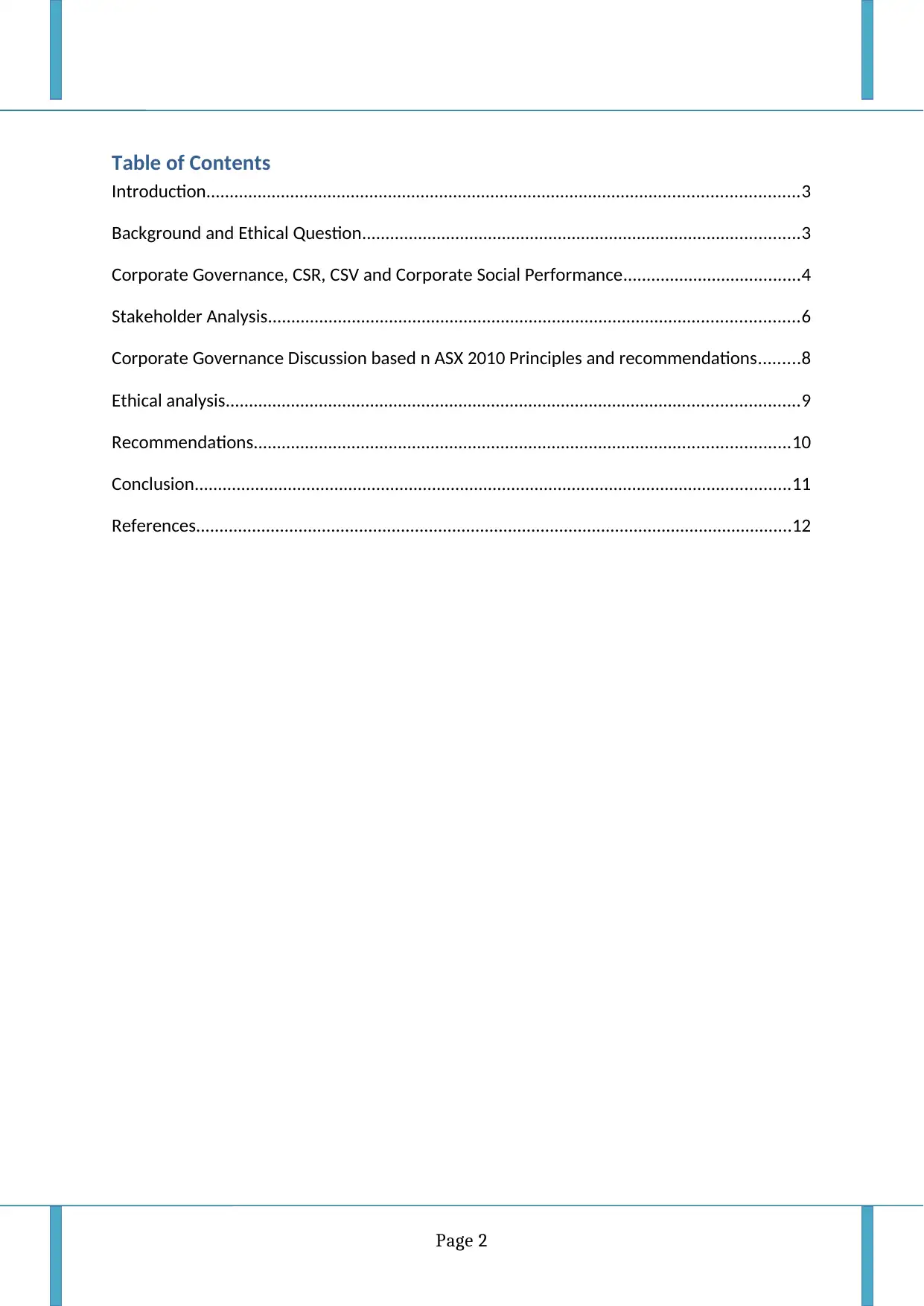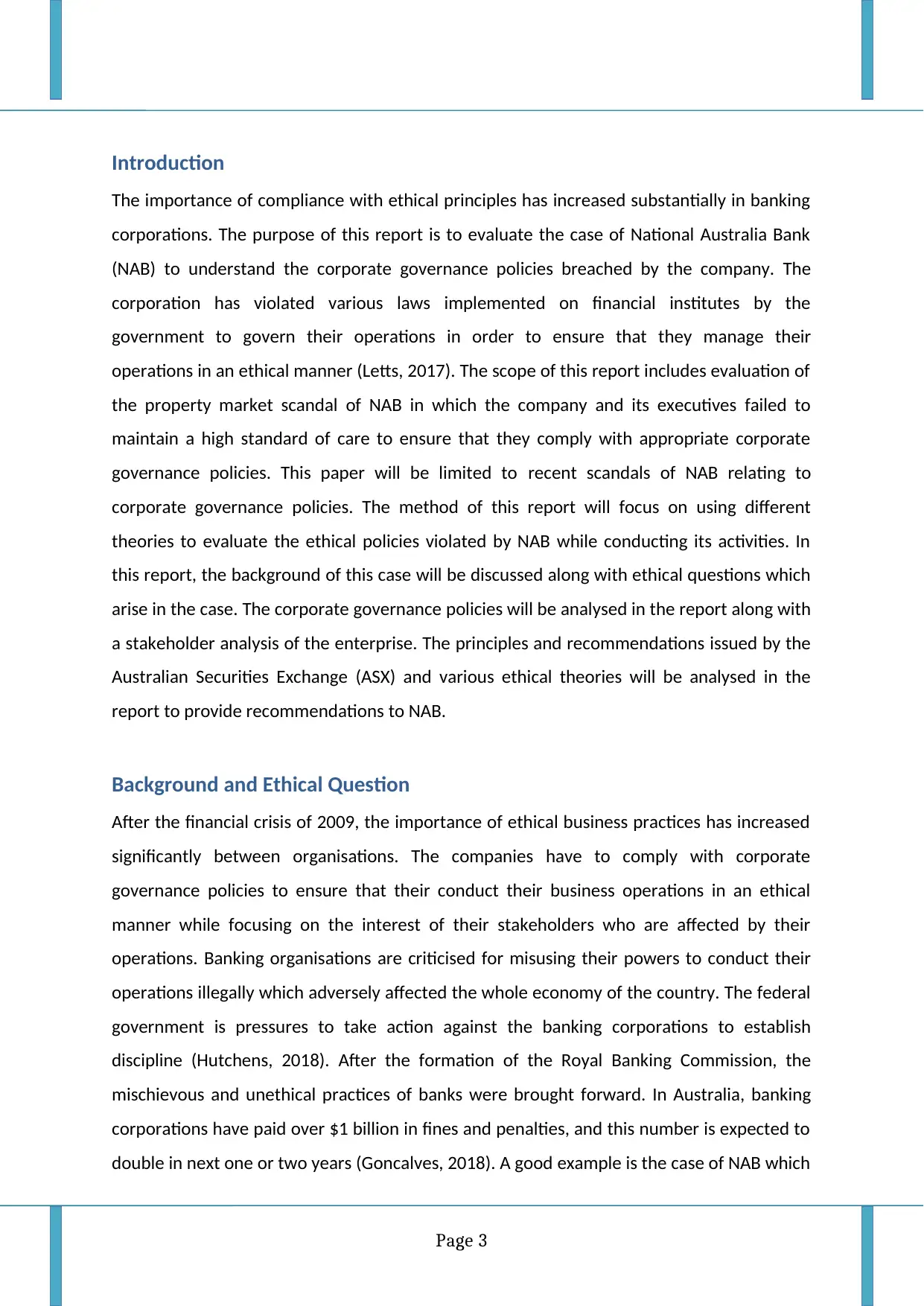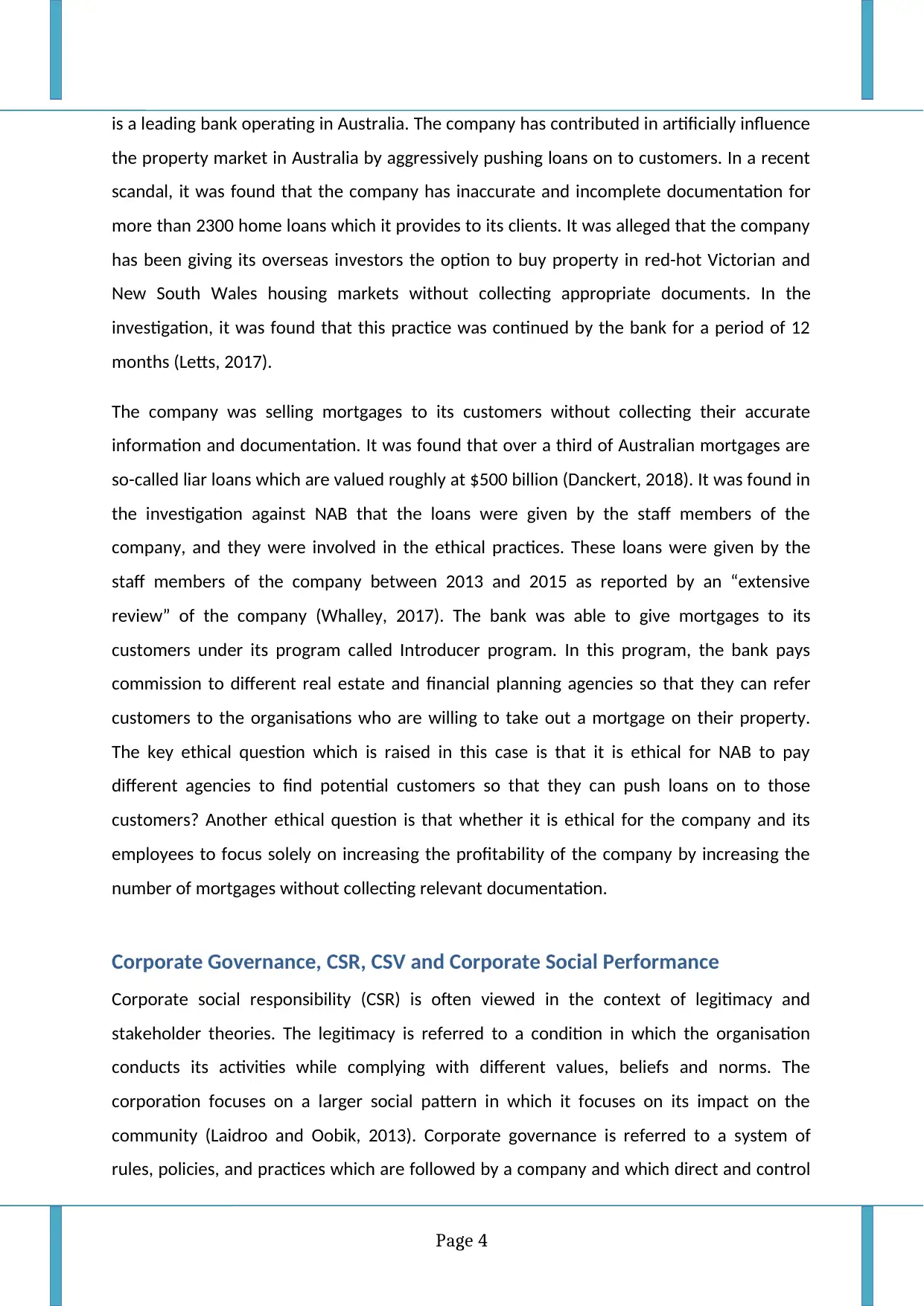Corporate Governance Failure: NAB Property Market Scandal Report
VerifiedAdded on 2021/09/17
|15
|4056
|193
Report
AI Summary
This report provides a comprehensive analysis of the National Australia Bank (NAB) property market scandal, examining the failures in corporate governance and their impact on various stakeholders. It explores the ethical violations, including the aggressive pushing of home loans without proper documentation, and the role of the introducer program in facilitating these practices. The report delves into the application of corporate governance principles, stakeholder analysis, and ethical theories to evaluate the case. It discusses the importance of Corporate Social Responsibility (CSR) and Creating Shared Value (CSV) concepts in the context of NAB's actions. The report also evaluates the case based on the Australian Securities Exchange (ASX) principles and recommendations. The report concludes with recommendations for NAB, including the implementation of an effective CSR structure, enhanced employee training, and improved systems to ensure ethical conduct and transparency. The analysis highlights the need for banks to prioritize ethical business practices and stakeholder interests to avoid financial and reputational damage.

Corporate Governance and Social Responsibility
Paraphrase This Document
Need a fresh take? Get an instant paraphrase of this document with our AI Paraphraser

Executive Summary
The purpose of this report is to evaluate the property market scandal of NAB to identify the
corporate governance failure of the company and its impact on the stakeholders of the
company. It was found that the company and its employees had failed to comply with
corporate governance guidelines since they pushed home loans on customers without
collecting relevant documents. Along with corporate governance, stakeholder analysis of
NAB is conducted in the report to identify how the operations of the company influence its
stakeholders. Various ethical theories are discussed in the report to evaluate the case from
an ethical perspective which provided that the actions of NAB were unethical.
Recommendations are given for NAB as well which include implementing of effective CSR
structure to promote transparency. A system should be implemented to check the working
of employees, and the company should provide ethical training to employees that assist
them in acting ethically.
Page 1
The purpose of this report is to evaluate the property market scandal of NAB to identify the
corporate governance failure of the company and its impact on the stakeholders of the
company. It was found that the company and its employees had failed to comply with
corporate governance guidelines since they pushed home loans on customers without
collecting relevant documents. Along with corporate governance, stakeholder analysis of
NAB is conducted in the report to identify how the operations of the company influence its
stakeholders. Various ethical theories are discussed in the report to evaluate the case from
an ethical perspective which provided that the actions of NAB were unethical.
Recommendations are given for NAB as well which include implementing of effective CSR
structure to promote transparency. A system should be implemented to check the working
of employees, and the company should provide ethical training to employees that assist
them in acting ethically.
Page 1

Table of Contents
Introduction...............................................................................................................................3
Background and Ethical Question..............................................................................................3
Corporate Governance, CSR, CSV and Corporate Social Performance......................................4
Stakeholder Analysis..................................................................................................................6
Corporate Governance Discussion based n ASX 2010 Principles and recommendations.........8
Ethical analysis...........................................................................................................................9
Recommendations...................................................................................................................10
Conclusion................................................................................................................................11
References................................................................................................................................12
Page 2
Introduction...............................................................................................................................3
Background and Ethical Question..............................................................................................3
Corporate Governance, CSR, CSV and Corporate Social Performance......................................4
Stakeholder Analysis..................................................................................................................6
Corporate Governance Discussion based n ASX 2010 Principles and recommendations.........8
Ethical analysis...........................................................................................................................9
Recommendations...................................................................................................................10
Conclusion................................................................................................................................11
References................................................................................................................................12
Page 2
⊘ This is a preview!⊘
Do you want full access?
Subscribe today to unlock all pages.

Trusted by 1+ million students worldwide

Introduction
The importance of compliance with ethical principles has increased substantially in banking
corporations. The purpose of this report is to evaluate the case of National Australia Bank
(NAB) to understand the corporate governance policies breached by the company. The
corporation has violated various laws implemented on financial institutes by the
government to govern their operations in order to ensure that they manage their
operations in an ethical manner (Letts, 2017). The scope of this report includes evaluation of
the property market scandal of NAB in which the company and its executives failed to
maintain a high standard of care to ensure that they comply with appropriate corporate
governance policies. This paper will be limited to recent scandals of NAB relating to
corporate governance policies. The method of this report will focus on using different
theories to evaluate the ethical policies violated by NAB while conducting its activities. In
this report, the background of this case will be discussed along with ethical questions which
arise in the case. The corporate governance policies will be analysed in the report along with
a stakeholder analysis of the enterprise. The principles and recommendations issued by the
Australian Securities Exchange (ASX) and various ethical theories will be analysed in the
report to provide recommendations to NAB.
Background and Ethical Question
After the financial crisis of 2009, the importance of ethical business practices has increased
significantly between organisations. The companies have to comply with corporate
governance policies to ensure that their conduct their business operations in an ethical
manner while focusing on the interest of their stakeholders who are affected by their
operations. Banking organisations are criticised for misusing their powers to conduct their
operations illegally which adversely affected the whole economy of the country. The federal
government is pressures to take action against the banking corporations to establish
discipline (Hutchens, 2018). After the formation of the Royal Banking Commission, the
mischievous and unethical practices of banks were brought forward. In Australia, banking
corporations have paid over $1 billion in fines and penalties, and this number is expected to
double in next one or two years (Goncalves, 2018). A good example is the case of NAB which
Page 3
The importance of compliance with ethical principles has increased substantially in banking
corporations. The purpose of this report is to evaluate the case of National Australia Bank
(NAB) to understand the corporate governance policies breached by the company. The
corporation has violated various laws implemented on financial institutes by the
government to govern their operations in order to ensure that they manage their
operations in an ethical manner (Letts, 2017). The scope of this report includes evaluation of
the property market scandal of NAB in which the company and its executives failed to
maintain a high standard of care to ensure that they comply with appropriate corporate
governance policies. This paper will be limited to recent scandals of NAB relating to
corporate governance policies. The method of this report will focus on using different
theories to evaluate the ethical policies violated by NAB while conducting its activities. In
this report, the background of this case will be discussed along with ethical questions which
arise in the case. The corporate governance policies will be analysed in the report along with
a stakeholder analysis of the enterprise. The principles and recommendations issued by the
Australian Securities Exchange (ASX) and various ethical theories will be analysed in the
report to provide recommendations to NAB.
Background and Ethical Question
After the financial crisis of 2009, the importance of ethical business practices has increased
significantly between organisations. The companies have to comply with corporate
governance policies to ensure that their conduct their business operations in an ethical
manner while focusing on the interest of their stakeholders who are affected by their
operations. Banking organisations are criticised for misusing their powers to conduct their
operations illegally which adversely affected the whole economy of the country. The federal
government is pressures to take action against the banking corporations to establish
discipline (Hutchens, 2018). After the formation of the Royal Banking Commission, the
mischievous and unethical practices of banks were brought forward. In Australia, banking
corporations have paid over $1 billion in fines and penalties, and this number is expected to
double in next one or two years (Goncalves, 2018). A good example is the case of NAB which
Page 3
Paraphrase This Document
Need a fresh take? Get an instant paraphrase of this document with our AI Paraphraser

is a leading bank operating in Australia. The company has contributed in artificially influence
the property market in Australia by aggressively pushing loans on to customers. In a recent
scandal, it was found that the company has inaccurate and incomplete documentation for
more than 2300 home loans which it provides to its clients. It was alleged that the company
has been giving its overseas investors the option to buy property in red-hot Victorian and
New South Wales housing markets without collecting appropriate documents. In the
investigation, it was found that this practice was continued by the bank for a period of 12
months (Letts, 2017).
The company was selling mortgages to its customers without collecting their accurate
information and documentation. It was found that over a third of Australian mortgages are
so-called liar loans which are valued roughly at $500 billion (Danckert, 2018). It was found in
the investigation against NAB that the loans were given by the staff members of the
company, and they were involved in the ethical practices. These loans were given by the
staff members of the company between 2013 and 2015 as reported by an “extensive
review” of the company (Whalley, 2017). The bank was able to give mortgages to its
customers under its program called Introducer program. In this program, the bank pays
commission to different real estate and financial planning agencies so that they can refer
customers to the organisations who are willing to take out a mortgage on their property.
The key ethical question which is raised in this case is that it is ethical for NAB to pay
different agencies to find potential customers so that they can push loans on to those
customers? Another ethical question is that whether it is ethical for the company and its
employees to focus solely on increasing the profitability of the company by increasing the
number of mortgages without collecting relevant documentation.
Corporate Governance, CSR, CSV and Corporate Social Performance
Corporate social responsibility (CSR) is often viewed in the context of legitimacy and
stakeholder theories. The legitimacy is referred to a condition in which the organisation
conducts its activities while complying with different values, beliefs and norms. The
corporation focuses on a larger social pattern in which it focuses on its impact on the
community (Laidroo and Oobik, 2013). Corporate governance is referred to a system of
rules, policies, and practices which are followed by a company and which direct and control
Page 4
the property market in Australia by aggressively pushing loans on to customers. In a recent
scandal, it was found that the company has inaccurate and incomplete documentation for
more than 2300 home loans which it provides to its clients. It was alleged that the company
has been giving its overseas investors the option to buy property in red-hot Victorian and
New South Wales housing markets without collecting appropriate documents. In the
investigation, it was found that this practice was continued by the bank for a period of 12
months (Letts, 2017).
The company was selling mortgages to its customers without collecting their accurate
information and documentation. It was found that over a third of Australian mortgages are
so-called liar loans which are valued roughly at $500 billion (Danckert, 2018). It was found in
the investigation against NAB that the loans were given by the staff members of the
company, and they were involved in the ethical practices. These loans were given by the
staff members of the company between 2013 and 2015 as reported by an “extensive
review” of the company (Whalley, 2017). The bank was able to give mortgages to its
customers under its program called Introducer program. In this program, the bank pays
commission to different real estate and financial planning agencies so that they can refer
customers to the organisations who are willing to take out a mortgage on their property.
The key ethical question which is raised in this case is that it is ethical for NAB to pay
different agencies to find potential customers so that they can push loans on to those
customers? Another ethical question is that whether it is ethical for the company and its
employees to focus solely on increasing the profitability of the company by increasing the
number of mortgages without collecting relevant documentation.
Corporate Governance, CSR, CSV and Corporate Social Performance
Corporate social responsibility (CSR) is often viewed in the context of legitimacy and
stakeholder theories. The legitimacy is referred to a condition in which the organisation
conducts its activities while complying with different values, beliefs and norms. The
corporation focuses on a larger social pattern in which it focuses on its impact on the
community (Laidroo and Oobik, 2013). Corporate governance is referred to a system of
rules, policies, and practices which are followed by a company and which direct and control
Page 4
1 out of 15
Related Documents
Your All-in-One AI-Powered Toolkit for Academic Success.
+13062052269
info@desklib.com
Available 24*7 on WhatsApp / Email
![[object Object]](/_next/static/media/star-bottom.7253800d.svg)
Unlock your academic potential
Copyright © 2020–2026 A2Z Services. All Rights Reserved. Developed and managed by ZUCOL.




